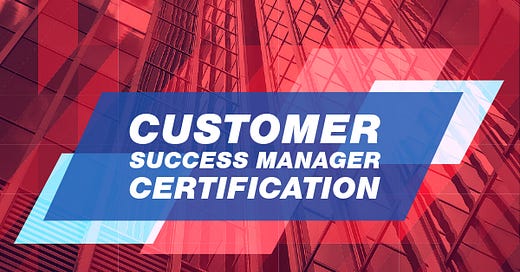CSM Certification: Pros, Cons, and Career Impact
Customer Success Management (CSM) certifications are a hot topic in the industry.
You might be wondering if these certifications can significantly boost your career.
So here are the pros and cons, and what really matters for your career advancement in Customer Success:
Pros of CSM Certifications
Knowledge Building and Confidence Boost
Certifications, like Gainsight Pulse Academy, provide structured learning paths.
They can build confidence, especially for those new to Customer Success or transitioning from non-SaaS backgrounds.
Industry Recognition and Credibility
Some certifications, such as the Certified Customer Success Manager (CCSM) program, are well-regarded in the industry.
They can enhance job opportunities and marketability by demonstrating proficiency and commitment.
Networking Opportunities
Certification programs often facilitate connections with other professionals in the field.
These networking opportunities can be invaluable for learning, mentorship, and job prospects.
Advantage for Entry-Level Positions
For those just starting in CS, certifications can set you apart in job interviews.
They demonstrate initiative and dedication to professional development.
Cons of CSM Certifications
Not a Substitute for Experience
Hands-on experience remains the most important factor in career progression.
Certifications alone don't guarantee success in a CS role.
Limited Impact on Hiring Decisions
Most hiring managers prioritize practical experience over certifications.
While certifications are a plus, they rarely outweigh relevant work experience.
Cost Considerations
Certifications typically cost between $100 to $450.
The return on investment should be carefully evaluated against potential career benefits.
Potential Lead Generation Tool
Some industry leaders view certifications as lead-generation tools for companies selling additional courses.
It's important to choose certifications based on their actual value, not just marketing hype.
What Really Matters in Customer Success Careers
Practical Skills and Experience
Hands-on experience managing customer relationships and driving outcomes is key.
For more on this, read my Ultimate Guide to Customer Success Managers.
Skills in AI, Data Analytics, and Project Management are highly valued.
Check out my Customer Success Manager Skills Guide for more insights.
Measurable Results and Impact
Achievements and measurable results in your current role matter more than certifications.
Focus on demonstrating how you've contributed to customer success and business goals.
Learn about key SaaS metrics and KPIs to track your impact.
Business Acumen and Cross-Functional Skills
Develop an understanding of how CS ties into overall business objectives.
Build skills across functions like sales, product, and data analysis. My guide on balancing sales and customer success in SaaS can help.
Leadership and Mentoring
Take on leadership roles in projects or mentor other team members.
These experiences often carry more weight than certifications in career progression.
Alternative Ways to Level Up Your Career
Continuous Learning and Adaptability
Stay up to date with industry trends through webinars, blogs, and industry events.
Check out these Customer Success Trends for the latest updates.
Develop the ability to adapt to changing customer needs and industry dynamics.
Networking and Mentorship
Connect with experienced CSMs and learn from their experiences.
Attend industry events and join professional networks to expand your connections.
My post on conference networking secrets can help you make the most of these opportunities.
Hands-On Customer Interaction
Prioritize direct customer engagement over internal meetings.
Real-world problem-solving and relationship-building are invaluable experiences.
Learn how to avoid common customer success mistakes to improve your interactions.
Self-Study and Skill Development
Focus on developing specific skills that align with your career goals and industry demands.
Consider free or low-cost online resources for skill development.
My list of best courses for customer success can be a great starting point.
Making the Right Decision
Certifications can be beneficial, especially for those new to the field.
But they should be part of a broader strategy for professional growth.
Here's what to consider:
Align any certification with your specific career goals and industry demands.
Prioritize gaining diverse, hands-on experiences in customer success roles.
Focus on developing practical skills that directly impact customer outcomes and business goals.
Build a network of industry professionals for learning and opportunities.
Continuously adapt and learn from real customer situations.
The Customer Success field is dynamic.
While certifications can provide theoretical knowledge and boost confidence, your ability to adapt, learn, and grow from real-world experiences will ultimately set you apart in your career progression.
For more insights on transitioning into a Customer Success career, read my article on Transitioning to a Customer Success Career.
If you're looking for the best certification programs, check out my guide on Best Certifications for Customer Success Managers.
Interested in advancing your career further? Explore my Customer Success Career Guide for comprehensive advice on growth and development in this field.
I hope that helps,
Hakan.
Ready to Take the Next Step in Your Customer Success Career?
If you're looking for exciting opportunities in the Customer Success field, don't miss out on our weekly curated list of top remote positions.
From entry-level to executive roles, we've got you covered.
Check out the Latest Remote Customer Success Jobs & Career Insights Weekly
Stay ahead in your career and discover your next big opportunity in Customer Success!



